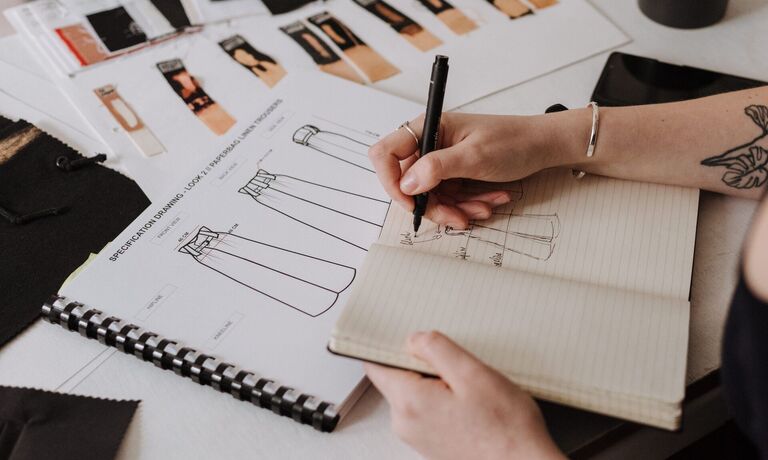- About us
About us
- News
- Projects
- Calendar
- Contributors
Contributors
- Blog
- Digital Inovation Hub
- Living Lab
- Contact

The whole concept of the CREATIVE EUROPE project “Co-Design for Sustainability” (CODES) is based on a participatory approach that directly involves the target groups and the stakeholders of the Fashion & Design (F&D) industry at all its stages.
Each project partner (Enter Koprivnica, Romagna Tech and KEPA) organized its own local focus group in September 2023 with the participation of representatives covering the triple helix of the Fashion & Design ecosystem (industry, academia – government). The common multiple scope of these local focus groups at project level was to validate the online survey results with the F&D actors, to gather insights and feedback for the development of the new platform tailored to the needs of fashion and design operators and to stimulate a participatory approach within the overall CODES concept. The 3 CODES project partners followed the same methodology by adjusting it to their own case and needs.
With respect to the outcomes, although there are some differences in the Fashion & Design sectors in the three countries (e.g. under-valued sector in Croatia or sectorial limitation in Greece), some needs and opportunities seem to be widely common in all territories. Internationalisation, Digital upskilling, constant Updating about the new trends in the field and Capacity building by connecting education and training with industry, are the main prioritised needs in the Fashion & Design sector. Especially, Networking is sought of being the key to the personal / professional / business / organisational / sectoral development in the F&D industry. Also, the new technologies are already extremely helpful for the Fashion & design sector and they still have to offer even more support at multiple levels (design, organisation of work, information, showcasing, collaboration, etc.).
The representatives of the F&D sector highlighted the need for a place where they can exchange ideas, connect with peers and other stakeholders in the fashion and design sector, present their work, find useful contacts and information about certain topics, and get support. In this context, they expressed their intention to join an online platform, which is centralised, authentic, user-friendly, easy to use, facilitates interaction, integrates digital application and social media, and reassures the protection of personal data and intellectual property.
After the completion of the local focus groups, a plenary transnational participatory session addressing the same targeted participants had been foreseen by the project, to share the main results and give first feedback on the CODES concept.
The Transnational Focus Group was held in October 2023, with the objective to put together the findings at local level, in order to identify common approaches and select the most promising inputs for the design of the CODES tool.
The workshop was highly interactive; after a series of some brief presentations by the project team, so that the attendees are aware of the research findings and of the CODES tool, the participants were divided in 3 groups and in separate zoom rooms, they worked in miro platform to produce and share ideas about the CODES tool. More specifically, they addressed the following topics / pillars of the CODES collaborative tool:
Cooperation – Networking – Showcasing
In terms of Cooperation, the participants in the transnational focus group stated that design-industry collaborations are vital for mutual growth. Currently, there are different types of collaborations within and around the Fashion & Design sector (with manufacturers of different fashion products, material suppliers, influencers, photographers, fashion schools etc.). More specifically, the remote collaboration favours the co-working at international and multisectoral level, which can be done through certain initiatives (such as public design competitions) and with the use of various tools and platforms (Mattoboard, Fiverr, Teams, Zoom, shared online folders, etc.). A platform that facilitates cooperation should be able to create a community that embraces the whole ecosystem around fashion & design, by offering possibilities to co-create, get informed and trained, have access to materials / products / professionals’ databases, through a combination of different tools that help different types of users and different purposes.
Regarding Networking, the target group finds that it is extremely important to have a way to connect with the people. The expansion of network is currently done via different kinds of events (exhibitions, shows, competitions, workshops and conferences) both in-person and online but also through digital means such as social media, web portals, platforms, webinars, etc. Moreover, the word of mouth, connections and recommendations from previous work and European projects also contribute to network widening. A platform that encourages networking should provide a wide range of possibilities to its members for promotion, capacity building, connection, sharing good practices – but experiences of failure as well – having integrated effective search tools.
Showcasing of work to potential clients and collaborators is achieved through events (festivals, exhibitions, shows, competitions, conferences), through connections (with professional associations and universities) and through social media (mainly Instagram and Tik Tok). An effective showcasing platform should have a user-friendly nicely designed interface with photos and videos that is linked to other online media and gives the opportunity to the members to present themselves and their work, interact with others, be guided on how to do online marketing and showcasing.
Overall, Networking seems to be the greatest need of the Fashion & Design sector and – thus – the most important element of any future collaborative tool. Cooperation comes second in the priorities of the people in the F&D industry. Another significant point that was derived from the whole research phase of CODES project, is the value of exploiting the new technologies in every part of such an online platform.
The results of this participatory approach with the inputs collected from the stakeholders are extremely useful and will be taken into consideration for the development of the CODES collaborative tool.